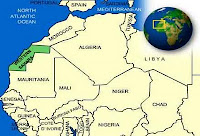Springtime for Western Sahara?
By Peter Kenworth
In many North African and Arab countries, the demands for democracy and economic redistribution of the so-called “Arab Spring”, have sounded the loudest from the region’s youth. The press has covered the protests in Egypt, Libya and Tunisia closely. But further from the limelight, Moroccan-occupied Western Sahara has experienced its own “spring”. Especially young Saharawis (the indigenous population of Western Sahara) demand that the Western Saharan liberation front, Polisario, adopts a more confrontational line against Morocco. They also demand that young people should have more influence on Western Sahara’s exile government, that has operated from a refugee camp in the desert in neighboring Algeria for over 30 years. Some youths even talk about the possibility of a military solution to the conflict because they do not believe that the peaceful UN-mediated approach, that has been pursued since the 1991 ceasefire between Morocco and the Saharawis, has yielded any results.
The frustration of the young Saharawis is not just a problem for the stability of Western Sahara or Morocco, but for an entire region that lies just across the Mediterranean from Europe. So even though we Europeans don’t seem to bother about the illegal occupation or Morocco’s repeated human rights violations against the Saharawis, we should at least intervene in earnest to avoid a potential war that will destabilise the region and see scores of refugees land on our doorstep. The Polisario Front held its 13th executive congress in December in the shadow of this threat, a congress that was attended by over 2000 delegates including 300 foreign ambassadors, politicians, NGOs, etc. from all over the world including Spain, the European Parliament, South America, South Africa and the African Union. Amongst other things, the congress delegates sent a letter to Morocco asking its people to”reflect on the serious consequences of more than 36 years of occupation of Western Sahara.” The congress also declared that Western Saharas former colonial power, Spain, “is responsible for what happens in Western Sahara” in a letter to Spanish Prime Minister, Mariano Rajoy.
The congress, that issues guidelines for the policy of the Polisario for the next four years and elects a new Polisario leadership, thus demonstrated very clearly that it wants less talk and more action from the parties that have a stake in the conflict to ensure the UN-sanctioned referendum on whether to integrate with Morocco or to become an independent nation. A referendum that Morocco has intentionally delayed since 1992, and which will in all probability lead to Western Sahara’s independence. ”There were sometimes divergent views about some ideas and plans during the congress, which are normal in frank, free and democratic discussions,” says the Polisario’s representative in Denmark, Abba Malainin, who attended the congress, “but there was always consensus on the core issue, which is the right of the Saharawis to self-determination and independence.”
The congress responded to the calls of the Saharawi youth for a more confrontational line by strengthening their participation in policy making, by e.g. making the president of the Saharawi National Union of Students a member of the Polisario’s leadership. Moreover, the Polisario have seemingly decided to rely less on the hitherto fruitless UN-negotiations in the future. ”For the moment we will continue the UN negotiations process,” says Abba Malainin, “as well as reinforcing the peaceful Intifada in the occupied territories of Western Sahara. But at the same time we are also strengthening the capabilities of the Saharawi Army, although a military solution will always remain a last resort. The final communiqué of the congress, on other hand, confirmed that ‘the continuation of the Moroccan occupation contributes to the heightening tensions and is a threat to the peace, security and stability of the entire region.’” If we Europeans want to avoid this “last resort” becoming a inevitability because the young Saharawis, like other young people in North Africa before them, come to believe that they have nothing left to lose, we should be much more responsive to their demands.
One specific demand that the congress made, and that we are able to respond to without delay, was that companies that operate in the region ought to “respect international law and not be involved directly or indirectly in the looting and theft of wealth of the oppressed Saharawi people.” Amongst other things, the EU could do so by making sure that the fisheries agreement with Morocco, that has for years allowed European fishermen to illegally fish of the coasts of Western Sahara, in not renewed.
By Peter Kenworthy, Master of Social Science, Africa Contact
Newstimeafrica, 31/1/2012



